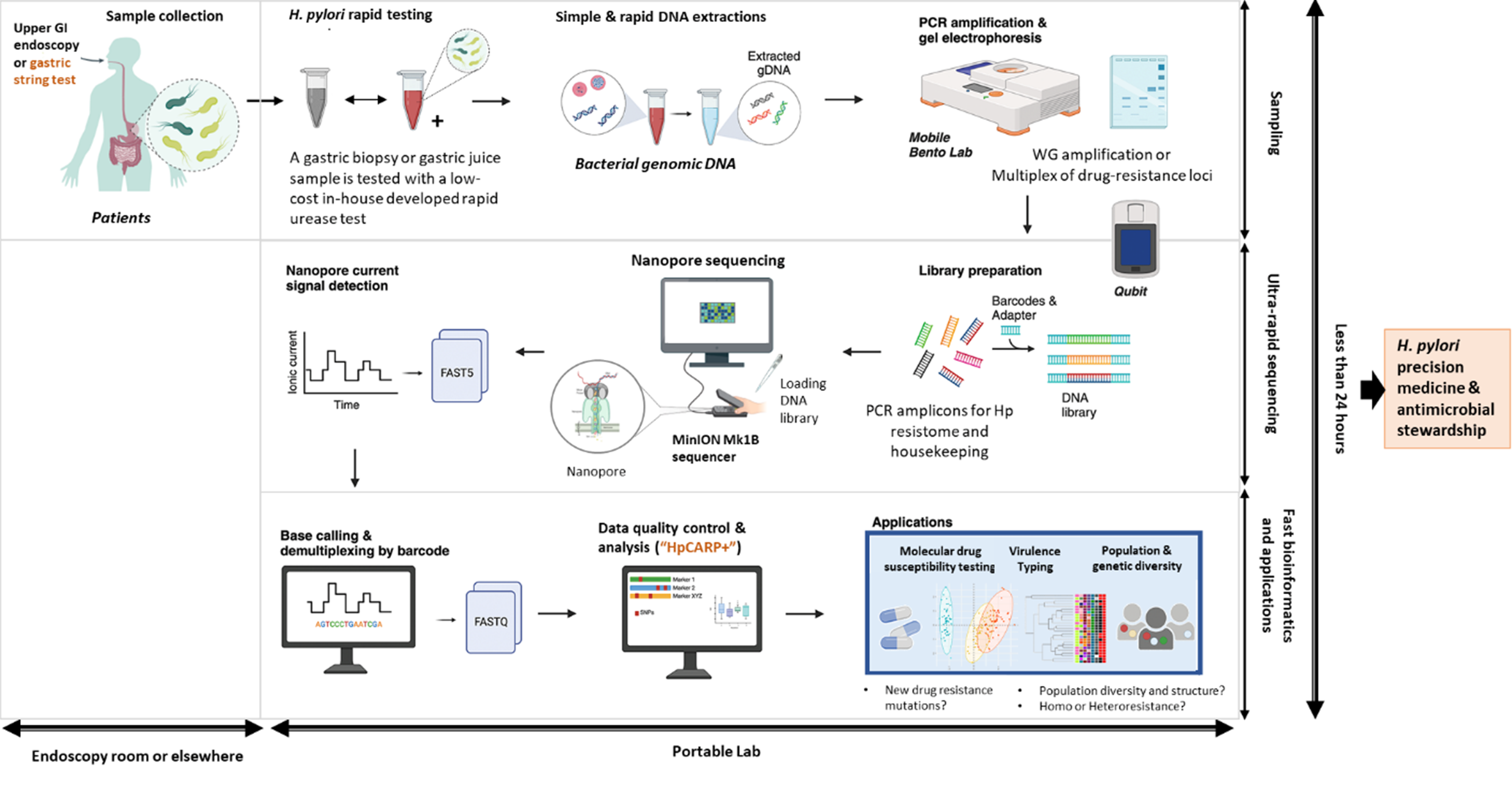Project Team
Principle Investigator
Evariste Tshibangu-Kabamba, MD, DTM&H, PhD
Team Members
Alain Cimuanga Mukanya, MD, PhD
Nadine Kayiba Kalenda, MD, MPH, PhD
Yu Nakagama, MD, PhD
Yasutoshi Kido, MD, PhD
Yoshio Yamaoka, MD, PhD
Developing a culture-free point-of-care testing system to embrace antibiotic stewardship in Helicobacter pylori therapies in African settings
Project Summary
Helicobacter pylori (H. pylori) is a bacterial infection linked to a wide range of diseases, including chronic gastritis, peptic ulcers, and gastric cancer—one of the deadliest gastrointestinal cancers. Effective treatment of this infection is essential for both public health and clinical practice. However, the increasing antibiotic resistance of H. pylori complicates treatment, particularly in Africa, where infection and resistance rates are highest, and diagnostic access is extremely limited. Therefore, this project develops a portable screening tool that uses molecular marker detection to identify H. pylori antibiotic resistance, bypassing the technically demanding and costly process of bacterial culture. It provides an end-to-end workflow, integrating bacterial genomics through Oxford Nanopore sequencing technology and customized bioinformatics tools to ensure optimal diagnostic performance, including feasibility, cost-effectiveness, quick turnaround time, and diagnostic accuracy with low resource demands. Beyond its clinical utility, this tool will generate real-world data in resource-limited African settings, paving the way for improved H. pylori treatment strategies and public health interventions.
Project Aims
This project aims to conduct a proof-of-concept study for establishing and evaluating a culture-free diagnostic system for the rapid detection and molecular antimicrobial susceptibility testing of H. pylori infection. This system directly tests for H. pylori and sequences its genome using gastric biopsy or gastric juice samples, bypassing bacterial isolation, which is time-consuming, technically demanding and not available in most African countries. The bacterial DNA is then processed with the “Helicobacter pylori Comprehensive Approach to Resistome Prediction” (HpCARP), a computational workflow developed to screen the genetic sequences of H. pylori for mutations reflecting resistance to antibiotics of clinical interest. The goal is to leverage the potential of clinical metagenomics using ultra-fast and portable Oxford Nanopore Technologies (ONT) to establish a bacterial culture-free, cost-effective, point-of-care system that can support antimicrobial stewardship in the treatment of H. pylori in African settings.

About the Principal Investigator

Evariste Tshibangu-Kabamba, MD, DTM&H, PhD
Project LeadAssociate Professor of Internal Medicine at the University of Mbujimayi
email: [email protected]
Dr. ETK is an Associate Professor of Internal Medicine at the University of Mbujimayi in the Democratic Republic of Congo (DRC) and a Specially Appointed Assistant Professor at the Research Center for Infectious Diseases Science at Osaka Metropolitan University in Japan. This dual role allows him to operate within a low-income environment burdened by numerous endemic infectious diseases while also engaging with a state-of-the-art medical research setting. His research utilizes molecular approaches to study infectious and gastrointestinal diseases, bridging basic and clinical sciences.
Dr. ETK earned his Ph.D. from Oita University in Japan in 2020 and is committed to building local capacity in his home country by practicing internal medicine, teaching, and conducting research. He completed further training in emerging infectious diseases at Osaka Metropolitan University and in tropical medicine at Nagasaki University Institute of Global Health and Tropical Medicine in Japan. His ongoing research focuses on developing an integrated platform for precision medicine in H. pylori eradication therapies and the prevention of gastric cancer in African settings. Additionally, he explores molecular solutions to tackle emerging and re-emerging infectious diseases in the DRC’s biodiversity-rich and challenging regions.
Dr. ETK has published his research in leading biomedical journals, including Nature Communications, Nature Reviews Gastroenterology & Hepatology, The Lancet Infectious Diseases, and Microbiology Spectrum. He is a member of several expert groups on H. pylori infection and gastric cancer at both African and global levels, such as the African Helicobacter and Microbiota Study Group, the H. pylori Genome Project Research Network, and the Helicobacter Genomics Consortium. In the DRC, he co-founded the Aurore Foundation, an NGO dedicated to the primary and secondary prevention of gastrointestinal cancers in the Congolese population.